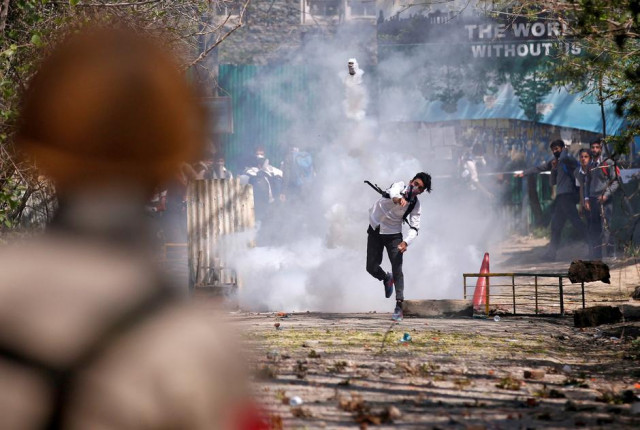Pakistan needs to ready itself to defend against aggression
Ex-diplomat warns against having expectations of support from China and US

A file photo of riots in IoK.
PHOTO: REUTERS
They were speaking at a roundtable discussion at Islamabad Policy Institute (IPI) on the ‘Abrogation of Article 370: Implications and Policy Options for Pakistan’.
Pakistan’s two former High Commissioners to India Ambassador Ashraf Jahangir Qazi and Ambassador Abdul Basit, Former Director-General Arms Control and Disarmament Branch of Strategic Plans Division Khalid Banuri, Assistant Professor Quaid-i-Azam University Dr Raja Qaiser Ahmed and Altaf Hussain Wani, Chairman Kashmir Institute of International Relations spoke on the occasion.
Ambassador Abdul Basit said that as Pakistan’s high commissioner to India he had forewarned in 2014 about the likely abrogation of Article 370 by the BJP government. He stressed the need to evolve a political consensus on Kashmir policy and suggested the downgrading of Pak-India's bilateral relations to the Charge de Affairs level.
Expressing reservations about the seven-member body constituted by Prime Minister Imran Khan to formulate response strategy to Indian actions on Kashmir, Basit said it should have a fixed time frame.
Ambassador Ashraf Jahangir Qazi warned against having unrealistic expectations of support from China and US.
He cautioned that Washington is likely to side with India on this issue. “The future of Kashmir now depends upon the resistance by Kashmiris.” He worried that Indians can resort to any means to control Kashmir while US economic pressure through FATF would constrain Pakistan’s options against India.
Former SPD Official Khalid Banuri advised that the International Court of Justice’s advisory opinion should be sought through United Nations General Assembly. He maintained that Pakistan, at the same time, needed to remain ready to defend itself against possible Indian aggression.
Prof Sajjad Bokhari, Executive Director IPI stated that the Indian action would destabilise the region and add to the miseries of Kashmiris living in Occupied Valley. He said New Delhi could ultimately change the demographic character of Jammu and Kashmir in an attempt to alter the fundamental nature of the conflict.
Dr Raja Qaiser said that the abrogation of Article 370 is a violation of the Indian constitution and it is unlikely to survive a legal challenge in the Indian Supreme Court. It is also a violation of the 1972 Simla Accord between Pakistan and India and the UN Security Council resolutions.
Altaf Hussain Wani shared the sentiments and concerns of the Kashmiri people on this development and said that Kashmiri people will continue their freedom struggle against the Indian occupation but expect Pakistan to increase its support for the cause.
Policy Analyst Syed Muhammad Ali said that Pakistan’s future Kashmir policy must holistically address the concerns of the Kashmiris and Pakistan’s security interests, besides commanding credibility in New Delhi and enjoying acceptability in the international community.
Published in The Express Tribune, August 8th, 2019.


















COMMENTS
Comments are moderated and generally will be posted if they are on-topic and not abusive.
For more information, please see our Comments FAQ